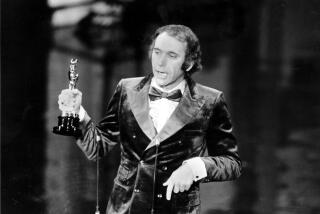Life After the Pulitzer : Uhry’s ‘Miss Daisy’ in High Gear
A hot Hollywood property got hotter Thursday when playwright Alfred Uhry won the Pulitzer Prize for best drama for “Driving Miss Daisy.”
“I’ve got a (congratulatory) call in to his hotel--and to the theater,” said producer David Brown, who’ll team with Richard D. Zanuck and Lili F. Zanuck to produce the film version of “Miss Daisy” for MGM.
Speaking from his New York City home, Brown enthused, “There’s no denying that a Pulitzer makes a film project more valuable, because now there’s another element of charisma involved.”
The story of a 25-year relationship between a former Southern schoolteacher and her black chauffeur, “Miss Daisy” spans the years 1948 to 1973 and sees its characters through myriad changes--including those wrought by the civil rights movement.
Dana Ivey and Morgan Freeman created the roles of Miss Daisy Werthan and Hoke Coleburn, with Ray Gills creating the role of Boolie Werthan, Miss Daisy’s son.
The play opened in April, 1987, at the 75-seat Playwrights Horizons Studio Theater in New York City. By the time it made its way to Off- Broadway’s 299-seat John Houseman Theater--where it will have its 300th performance April 12--Hollywood interest was reported to be intense.
Frances Sternhagen, Earle Hyman and Gills are currently starring Off-Broadway. According to a source close to the playwright, offers from film makers included Steven Spielberg, Sam Goldwyn and Rob Reiner.
Zanuck-Brown outbid them, with an offer, says one industry insider, in excess of $500,000 and an interest in the movie’s profits. (Uhry and the play’s producers are partnered in the deal, on what is said to be a traditional 60-40 author-show split.)
That contract doesn’t include a clause involving increased monies as a result of a Pulitzer win. “No, a Pulitzer wasn’t a part of the deal,” Brown said, laughing, “but there are a lot of clauses.”
An escalation clause in the contract restricts the film makers from releasing the film version for a 24-month period, which ends in July, 1989. (Escalation clauses are customary with hit plays to prevent a film version from harming the play’s initial run.)
As it happens, that clause fits in nicely with Zanuck-Brown’s production plans. Bruce Beresford, who will direct “Miss Daisy,” is committed to directing “Her Alibi,” a film starring Tom Selleck, for Warner Bros. that starts in early summer. “So he won’t be available to do our film until late this year or early 1989,” said Brown. “We don’t anticipate a release date until around November of 1989.”
Brown predicted that Beresford, who is Australian, will have “just the right eye” for looking at what is an indelibly American project, in spirit, locale and tone. Uhry, who is scripting, has already submitted a first draft. “You should ask him about it,” said Brown.
Reached in Chicago, where “Miss Daisy” is now in rehearsals for an April 24 opening at the Briar Street Theater (with Sada Thompson and Bill Cobbs headlining), Uhry was jubilant.
“The (Pulitzer) honor is more than enough for me for the rest of my life,” he declared, explaining that the first call he made--after being notified he had won--was to his wife at their New York home. “And I had to leave a message on the answering machine!” A call to his mother, in Atlanta, Ga., produced better results: “She was there. And she shrieked.”
(Uhry echoed Brown’s comments that his contract is already cinched--and that the Pulitzer will not inflate his price. “But that’s not a bad idea. Can we somehow alter the contract?” he joked.)
Uhry hopes to “open up” the play as a film. “I’m putting in some characters I only talk about in the play. (I hope this won’t inflate the story.) I’m thinking more visually. I think it’s going to work. I first thought of ‘Miss Daisy’ as a movie, to begin with.”
Uhry spent 20 years in the musical theater. He earned a Tony nomination for best book for a musical in 1976 for “The Robber Bridegroom,” but was contemplating a career change--considering a teaching job--when he decided to make a final attempt at theater and wrote the dramatic “Miss Daisy.”
“Do I really have to say that there are no regrets?” he said with a laugh.
As for Hollywood’s interest, Uhry admitted, “I’m pretty flabbergasted. You know, there was a kind of bidding war.”
He also continues to be enthralled at the names bandied about for the role of Miss Daisy.
Those names have included the likes of Bette Davis, Katharine Hepburn (who reportedly wants to team with Sidney Poitier), Anne Bancroft, Maggie Smith, Angela Lansbury and Lucille Ball. “You can just say that everyone’s interested,” Brown said, adding that no decisions have been made.
Asked about his preferences, Uhry said, “I can’t even begin to think about who should be Miss Daisy. Each week I come up with a different name. But, for the chauffeur, I’m rooting for Morgan (Freeman). He created the part, he did a wonderful job, and if I had my way, I’d go with him for the film.”
Added Uhry, “I’m also rooting for Morgan to get his award.” He referred to Freeman’s Academy Award nomination for best supporting actor in “Street Smart.” “I’m hoping we’ll both be winners.”
After a week in Chicago, “to help get this production off the ground,” Uhry heads for London, where Wendy Hiller will star as Miss Daisy. A national touring company gets under way in the fall, with Julie Harris.
The prestigious roll call of would-be Miss Daisys and future Miss Daisys delights Uhry: “Is that a bevy of winners, or what? I couldn’t get luckier.”
More to Read
The biggest entertainment stories
Get our big stories about Hollywood, film, television, music, arts, culture and more right in your inbox as soon as they publish.
You may occasionally receive promotional content from the Los Angeles Times.










